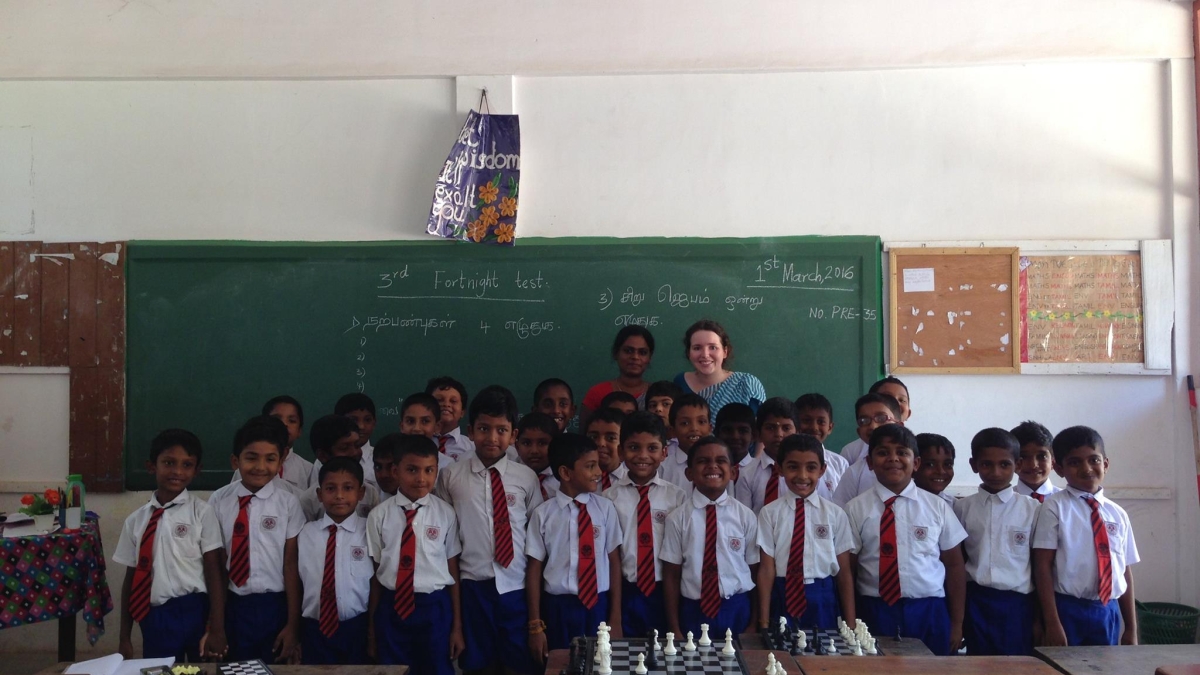The personal growth and insights that come with living abroad for a year are huge. Fulbright award winners must overcome language barriers but they also create lasting relationships while being immersed in new cultures.
For some, even the little changes are fun.
Cameron Tattle, who earned a degree in global studiesfrom the School of Politics and Global Studies in the College of Liberal Arts and Sciences at Arizona State University, won a Fulbright to be an English teaching assistant in Sri Lanka
“I can now eat the spiciest foods you can imagine without batting an eye!”
Tattle answered some questions about her Fulbright experience:
Question: Why did you decide to apply for a Fulbright?
Answer: After traveling to Bangladesh to help start a non-profit in the summer between my sophomore and junior year I decided I wanted to go back. Whilst there, I met the current Fulbrighters who convinced me to apply.
Q: Can you give an overview of what you’re doing in Sri Lanka:
A: I live in Jaffna, Sri Lanka. It is the most northern province, so I’m actually much closer to India than I am to the capital, Colombo. I am a third-grade English teacher at St. John’s College — a private all boys school. Most of my time is devoted to teaching but I also have some side projects, such as a community mural and a photography club that I started.
Q: What is a typical day like for you?
A: I usually wake up around 7 and get my saree on so I can walk to school. I teach all day until 2. Afterwards I will usually go to one of my projects or if I’m free I may hit the market to pick up some fresh produce for dinner.
Q: What do you do on the weekends?
A: Weekends are spent exploring the neighboring villages and islands. I also try to get to my local Hindu temple for women’s yoga on Saturday and Sunday mornings. At night, the other teaching assistant in Jaffna and I will often go to see a Tamil movie — thankfully there are English subtitles. I live in a very conservative town, so there are no other forms of nightlife besides the movie theater.
If I have a long weekend I try to go see other cities in Sri Lanka. Often the other teaching assistants and I will try to meet up there.
Q: What’s been the best part of your experience?
A: It would be my students. All 35 of them. It is a high-impact position and I have been so fortunate to see my students learn and change so much in my time here.
Q: Have there been any challenges?
A: I think the hardest one so far has simply been adjusting to the gender norms. For example, many people are originally surprised that I came here without my family as I am a young, unwed female.
Q: Has anything funny happened during your adventure?
A: I think it is always funny to explain to people how my freckles are not a “skin disease” and that I will not be having surgery when I return home to fix them.
Q: What will you bring back from your experience that will help you in your career — or your life?
A: First, a deeper understanding of a new culture. It may sound so cliché, but it is so true. Secondly, two new languages, Tamil and Sinhala. Thirdly, my patience has definitely increased. Everything here is done on “Sri Lankan Time.”
Q: What’s next for you, after you return?
A: I am planning on working this next year before hopefully heading off to law school.
Q: What would you tell someone who is contemplating applying for a Fulbright?
A: Just do it. One of the hardest parts is the application. Make sure you start it as soon as possible! Secondly, really think about the “why.” Fulbright is very selective. I think a lot of it comes down to having a solid reason and connection to the country you’re applying for.
More Local, national and global affairs

How ASU research is helping first responders
Arizona State University’s faculty members are studying how to improve the jobs, health and well-being of first responders, and also applying their research through direct training to help these…
ASU honors Sun Devils, local organizations with Social Work Month Awards
Arizona State University’s School of Social Work recently honored a total of 29 students, faculty, staff, alumni and local community organizations with its annual Social Work Month Awards.The…

ASU's USAID projects provided economic benefits to US
For more than a decade, Arizona State University has helped people around the world — and advanced interests in the United States at the same time — through its collaborative projects with the U.S.…


